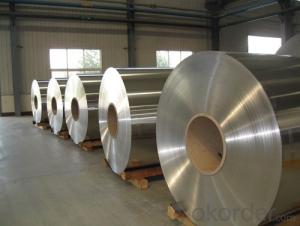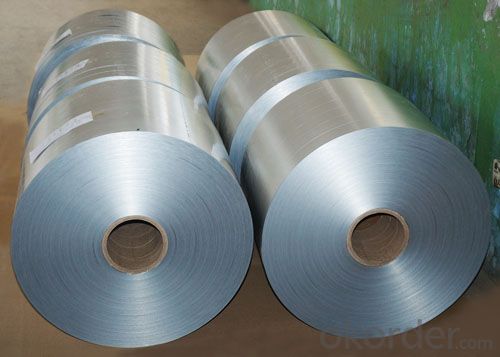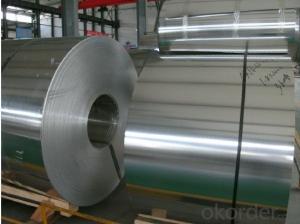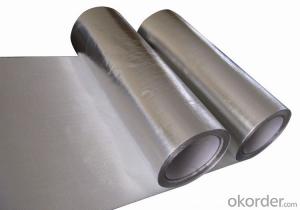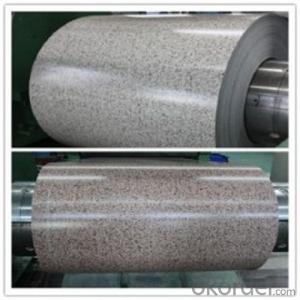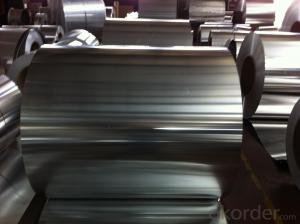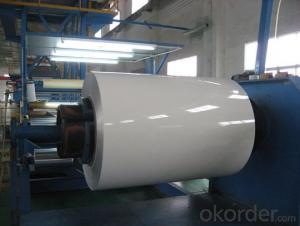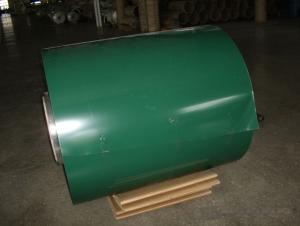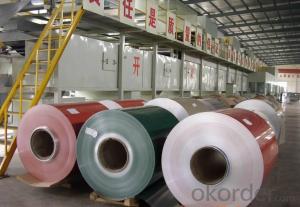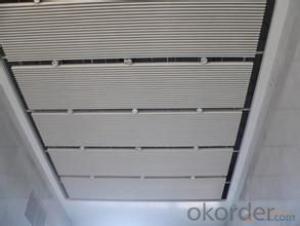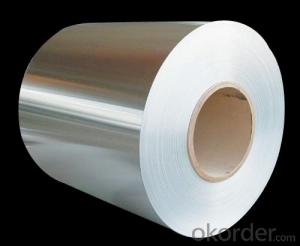Aluminum Coil Minnesota 1100 Alloy for Roofing/Ceiling/Gutter/Decoration
- Loading Port:
- Shanghai
- Payment Terms:
- TT OR LC
- Min Order Qty:
- 2 m.t.
- Supply Capability:
- 70000 m.t./month
OKorder Service Pledge
OKorder Financial Service
You Might Also Like
Specification
Alloy 1100 Aluminium Coil for Roofing/Ceiling/Gutter/Decoration
Specification
Grade
| 1000 Series: 1050 1060 1070 1100 1200 1235 etc. 3000 Series: 3003 3004 3005 3104 3105 3A21 etc. 5000 Series: 5005 5052 5083 5086 5154 5182 5251 5754 etc. 6000 Series: 6061 6063 6082 6A02 etc. 8000 Series: 8006 8011 8079 etc. |
Thickness | 0.05~10mm |
Width | <1600mm< span=""> |
Color | Metallic, Solid, RAL or by customer requirements |
Coating paint: | PVDF(Polyvinylidene Fluoride), PE(Polyester ) |
Coating thickness | as per customer’s request |
Gloss | 10-90%(EN ISO-2813:1994) |
Total coating thick | Polyester18~25micron(EN ISO-2360:1995) PVDF25 ~35micron(EN ISO-2360:1995) |
Coating hardness | 2H |
Protective film | PVC film, Colorless transparent or White-black |
Adhesion | 5B (EN ISO-2409:1994) |
Impact resistance | No cracking and peeling (A.S.T.M D2794-1993) |
Flexibility (T-bend) | 0T- 2T |
Temper | H16, H18, H24, H26, H26 |
Certification | ISO9001:2000, CE, SGS |
Coil's standard diameter | 1100mm |
Inner Diameter | 405mm/505mm |
Coil's standard weight | 2000kgs |
Payment | L/C ,T/T |
Packing
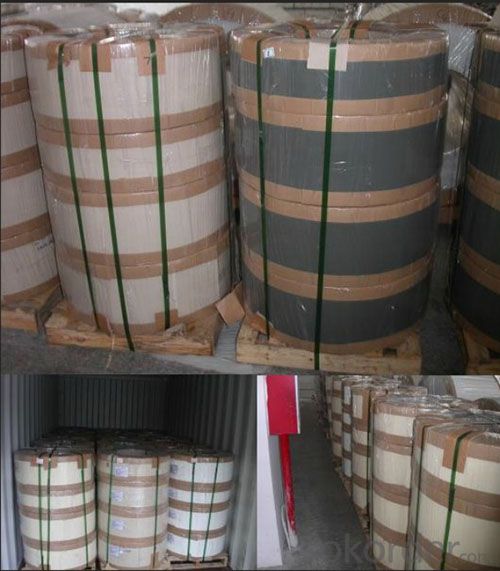
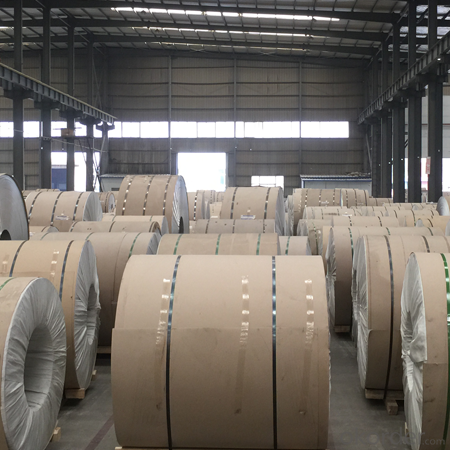
FAQ
Q: How can I request a product sample? A: The samples are free but freight should be collected. Please send sample list and courier account number by email.
Q: How can I request a product catalog? A: The hard copies of catalogs are free but freight should be collected. Please send courier account number by email. You are suggested to request a PDF catalog.
Q: Wha's your payment terms? A: One is T/T 30% before production and 70% against copy of B/L; the other is Irrevocable L/C 100% at sight.
Q: What's your trade terms? A: FOB, CNF(CFR), CIF, EXW.
Q: How long is the quality guarantee? A: All of our products have a period of quality guarantee since time of shipment. Please contact your salesman for more details, as different products enjoy different time of guarantee
- Q: What are the common applications of aluminum coils in the aerospace industry?
- Aluminum coils are commonly used in the aerospace industry for various applications such as constructing aircraft frames, manufacturing wings, building fuselages, and designing engine components. The lightweight yet strong nature of aluminum makes it an ideal choice for these purposes, as it helps reduce overall aircraft weight, enhance fuel efficiency, and improve performance. Additionally, aluminum's corrosion resistance properties play a crucial role in ensuring the longevity and durability of aerospace structures.
- Q: What are the transportation and storage requirements for aluminum coils?
- Transportation and storage requirements for aluminum coils depend on several factors. Firstly, it is important to handle the coils with care during transportation to avoid any damage. They should be packaged securely to prevent any potential scratches, dents, or deformation. The coils should be protected from moisture, as exposure to water or high humidity levels can cause corrosion. During transportation, it is recommended to use appropriate vehicles or containers that can adequately support the weight and dimensions of the aluminum coils. The coils should be properly secured in place to prevent any movement or shifting that could lead to damage. When it comes to storage, it is crucial to store aluminum coils in a clean, dry, and well-ventilated area. Ideally, the storage facility should maintain a stable temperature and humidity level to prevent any adverse effects on the coils. If the coils are stored outdoors, they should be properly covered and protected from direct sunlight, rain, and other weather conditions. Furthermore, it is important to store aluminum coils away from any corrosive materials or chemicals that could potentially cause damage. They should be stored in a manner that prevents contact with other materials, as physical contact can lead to scratching or other forms of damage. Overall, the transportation and storage requirements for aluminum coils involve careful handling, protection from moisture and corrosive materials, proper packaging and securing during transportation, and storage in a clean and suitable environment. By following these guidelines, the integrity of the aluminum coils can be maintained, ensuring their quality and usability.
- Q: What role does the powdered aluminum play in this reaction?
- Aluminum is what burns or combines with oxygen. Learn How, you have it backwards. Iron oxide is the oxidizer.
- Q: How do aluminum coils compare to magnesium coils in terms of strength?
- Aluminum coils generally have higher strength compared to magnesium coils. Aluminum is known for its excellent strength-to-weight ratio, making it a popular choice in various industries. It has a higher tensile strength and better resistance to deformation under stress compared to magnesium. Additionally, aluminum has a higher yield strength, which means it can withstand greater loads before experiencing permanent deformation. On the other hand, magnesium is lighter than aluminum, but it tends to have lower strength properties. While magnesium coils might be advantageous in some applications where weight is a critical factor, aluminum coils are generally preferred in terms of strength and durability.
- Q: i have about 100lbs of aluminum blocks and scrap.
- WOW.......they must be worth sum money. Lucky you!!!!!!
- Q: The general roll also 5,6t appearance, specific to your own weigh, length, weight = / (width * thickness * density)
- Oh, landlord, this question is a little interestingIf it is the embryo of the aluminum plant, the aluminum roll is usually 5-6 tons a rollFor a while, in the merchant or the direct manufacturer, it is necessary to see how large the material rack is in the factory. It is usually 1.5-2 tons, and there are also three tons.Yes, please!
- Q: This question asks about the environmental impact of aluminum coils, including potential effects on the ecosystem and human health.
- <p>Aluminum coils, when produced and used responsibly, have minimal environmental impact. However, improper disposal or manufacturing can lead to pollution. Aluminum production requires significant energy, contributing to greenhouse gas emissions. During manufacturing, if not managed properly, can release harmful substances into the air and water. Yet, aluminum is highly recyclable, reducing its environmental footprint over time. When disposed of improperly, aluminum can contribute to litter and leach harmful substances into the soil and water, affecting wildlife and potentially human health. Responsible recycling and manufacturing practices are crucial to mitigate these effects.</p>
- Q: Can aluminum coils be used for electrical enclosures?
- Yes, aluminum coils can be used for electrical enclosures. Aluminum is a commonly used material for enclosures due to its excellent conductivity, lightweight nature, and resistance to corrosion. It provides good protection against electromagnetic interference and can effectively dissipate heat. Additionally, aluminum coils can be easily formed and fabricated into various shapes and sizes, making them suitable for electrical enclosures in different applications.
- Q: What is the typical thickness tolerance for aluminum coils?
- The typical thickness tolerance for aluminum coils can vary depending on the specific requirements and industry standards. However, in general, the typical thickness tolerance for aluminum coils is often specified within a range of +/- 0.002 to 0.005 inches. This means that the actual thickness of the aluminum coil can deviate from the specified thickness by a maximum of either 0.002 or 0.005 inches, depending on the specific tolerance requirements. It is important to note that these tolerances can also be expressed as a percentage of the specified thickness, typically ranging from 4% to 8%. These tolerances ensure that the thickness of the aluminum coil meets the desired specifications and allows for a certain level of variation that is within acceptable limits for the intended application.
- Q: I need ideas on soundproofing a 12' aluminum fishing boat?
- I have found that lining the boat with carpet makes a great sound proofer. Used carpet is a lot more pliable and cheaper to obtain. You can glue it in with liquid nails or such, or you can just set it inside so it can be removed when you need to dry out the boat. You can even put strips of foam board under the carpet to help even more. Glue your carpet to the foam board and then you have removable panels to ease with cleaning.
Send your message to us
Aluminum Coil Minnesota 1100 Alloy for Roofing/Ceiling/Gutter/Decoration
- Loading Port:
- Shanghai
- Payment Terms:
- TT OR LC
- Min Order Qty:
- 2 m.t.
- Supply Capability:
- 70000 m.t./month
OKorder Service Pledge
OKorder Financial Service
Similar products
Hot products
Hot Searches
Related keywords
